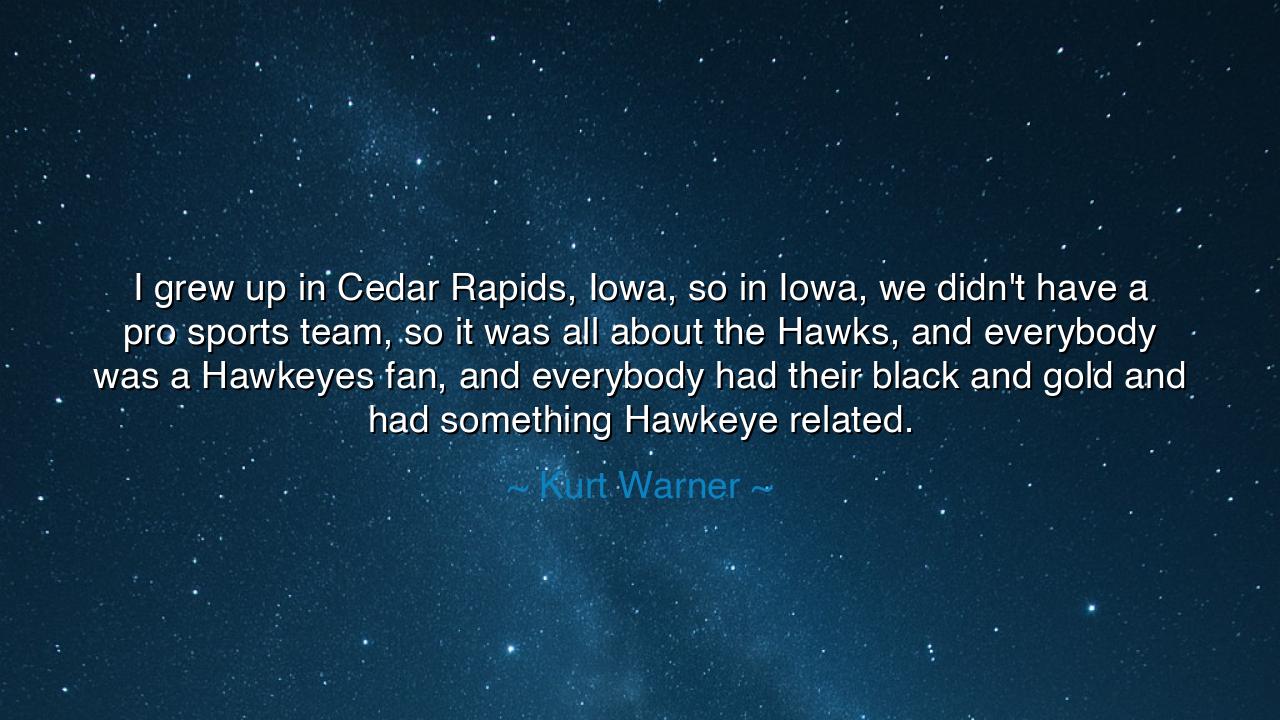
I grew up in Cedar Rapids, Iowa, so in Iowa, we didn't have a
I grew up in Cedar Rapids, Iowa, so in Iowa, we didn't have a pro sports team, so it was all about the Hawks, and everybody was a Hawkeyes fan, and everybody had their black and gold and had something Hawkeye related.






Hear the words of Kurt Warner, who rose from humble beginnings to the heights of glory, and yet remembered his roots with gratitude: “I grew up in Cedar Rapids, Iowa, so in Iowa, we didn’t have a pro sports team, so it was all about the Hawks, and everybody was a Hawkeyes fan, and everybody had their black and gold and had something Hawkeye related.” These words are not merely about games, nor about colors of cloth; they are about belonging, identity, and the power of community to shape the spirit of one who will one day inspire nations.
When Warner recalls his youth in Cedar Rapids, he paints for us a picture of a place without the glamour of professional arenas, where no great city teams commanded the devotion of the people. Instead, the people found unity in the Hawkeyes, the team that bore their name, their pride, their struggle, and their triumphs. To wear the black and gold was not simply to cheer a game—it was to declare loyalty to one’s land, to one’s people, to the story that bound them all together.
In this we see the ancient truth: when there is no empire, the village becomes the kingdom; when there is no grand spectacle, the local heroes become legends. For Warner and the people of Iowa, the Hawkeyes were not just a college team—they were a symbol of shared identity, a fire that drew families, neighbors, and strangers into fellowship. The power of community lay in those colors, in that devotion, in the simple fact that “everybody had something Hawkeye related.”
History shows us parallels. In the Greek city-states, before the rise of sprawling empires, the people gave their devotion to the athletes of Olympia, who carried the honor of their city. When a runner of Athens or a wrestler of Sparta competed, it was not just his victory but the city’s glory. The banners of Iowa’s black and gold stand in that same tradition. They remind us that unity in symbol and loyalty in spirit can raise even the smallest community into greatness.
The deeper meaning of Warner’s words is this: greatness does not spring from isolation, but from roots sunk deep in community. Though he would one day lift the Lombardi Trophy as a champion of professional football, he was first shaped by the pride of his people, by the fire of shared loyalty, by the lessons of what it means to belong. His success was not born in solitude, but in the soil of Cedar Rapids, watered by the collective spirit of a town that found itself in the Hawkeyes.
The lesson for us is clear: never despise the small loyalties of your youth. The team you cheered, the school you loved, the traditions you shared with your neighbors—these are not trifles, but the foundation of your spirit. For in them you learn the meaning of loyalty, of pride, of hope, and of perseverance. Such lessons will guide you when you stand upon larger stages, for they anchor you to something greater than yourself.
The practical action is this: honor the symbols and communities that shaped you. Wear their colors, remember their stories, speak their names with pride. And when you find yourself far from home, carry those loyalties as a compass in your heart. For as Warner’s story teaches, even in the grandest arenas, it is the memory of your beginnings that gives you strength.
Thus, his words are not only nostalgia but a testament: the black and gold of Iowa is more than fabric—it is the color of belonging. And the child who grows up in such a community, even without the lights of professional fame, carries with him a strength forged in loyalty. From Cedar Rapids to the Super Bowl, Kurt Warner’s life proves that the pride of a people can raise one of their own to touch greatness.






AAdministratorAdministrator
Welcome, honored guests. Please leave a comment, we will respond soon